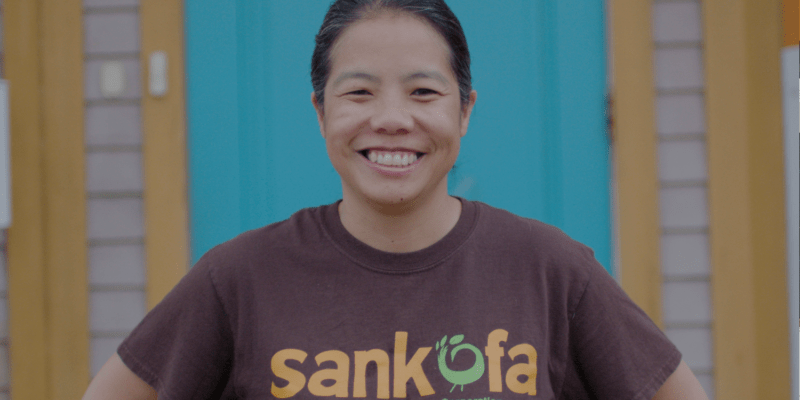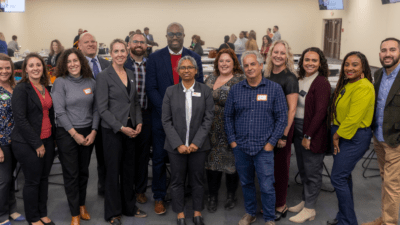The W.K. Kellogg Foundation (WKKF) has convened a cohort of influential investors (endowments, investment banks, corporations and individuals) for an experience called Reimagining Opportunities for Investment (ROI) in the South, an exploration of diverse investment opportunities in the U.S. South. This dynamic group of investors is coming together to mobilize a sustainable investment ecosystem for Black, Indigenous, Latino and other undercapitalized communities of color in the American South.
Following our Every Child Thrives features looking at the region as a whole, opportunities in Mississippi and New Orleans, and opportunities in the agriculture sector, this story switches to an issue lens and looks at how a reentry lens can be incorporated into investments in the South.
People of color are disproportionately impacted by high rates of incarceration, making it one of the most pressing racial equity challenges of our time. In the South, where incarceration is one of the legacies of chattel slavery, these rates are some of the highest in the world, including high rates of incarcerated children. This session of the ROI in the South series examined how investors can play a role in addressing this issue, particularly those investing with an eye toward achieving racial equity in the South.
Recidivism is one of the drivers of high incarceration rates. Each year, more than 600,000 individuals are released from U.S. prisons. More than two-thirds of formerly incarcerated people are rearrested within three years of their release and half are reincarcerated. The societal impact of incarceration and recidivism is significant: children and families are destabilized; individuals aren’t able to economically support their families; and it leads to intergenerational poverty and instability.
Lack of access to stable, living-wage employment is the leading contributor to recidivism in the United States. Creating ways for formerly incarcerated individuals to find stable employment could yield significant, long-term benefits for families, communities and businesses across the region.
The Business and Investment Opportunities
There are compelling reasons for investors to incorporate a reentry lens. In addition to the impacts on families and communities, particularly families and communities of color, providing pathways to employment for returning citizens can help businesses and sectors address existing workforce issues. Many companies are looking to diversify their workforces, increase their pool of potential candidates, retain employees, and embed DEI and justice principles. Working with returning citizens can help to accomplish those goals while also increasing a company’s stability and operations. A 2021 report showed that 85% of human resource and 81% of business leaders report that individuals with criminal records perform the same as or better than employees without criminal records. People with records are often the most dedicated employees in a company and among those with the best retention rates.
The W.K. Kellogg Foundation’s report, the Business Case for Racial Equity, finds:
- The U.S. stands to gain $2.7 trillion in GDP by 2050 by closing the racial equity gap
- $30 billion estimated savings in annual state and federal prison costs if Blacks and Hispanics/Latinos were incarcerated at the same rate as Whites
- $50 billion projected savings in annual state and federal prison costs by 2050 if incarceration rates were consistent with population parity
Hiring and integrating returning citizens, and investing in companies that do so, means navigating complex cultural and legal issues. Since 2013, WKKF has made more than $150 million in grants and investments that support formerly incarcerated individuals, including workforce development and upskill training programs. In 2018, WKKF partnered with Slack and FREEAMERICA to create Next Chapter, a program designed for formerly incarcerated people to get trained and placed in skilled, longer-term employment in the tech sector.
During this ROI in the South session, three experts joined the conversation to discuss how businesses and investors successfully implement this lens. They were Kenyatta Leal, executive director of Next Chapter; Andre Peart, founder and CEO of Untapped Solutions; and Deepti Rohatgi, executive director of Slack for Good. They shared the following insights:
Key Takeaways
Critical to hiring and retaining returning citizens is ensuring they have multiple forms of support. Peart and Leal, both of whom spent time in prison, emphasized that individuals face multiple gaps upon reentry that affect their ability to create stability and connections. Preparing individuals requires not just hard-skills training but also coaching, mentorship, soft skills training and support. Untapped Solutions is a tech platform that connects returning citizens to employment, but a core part of its approach is to first connect them with multiple other services – health care, banking, nonprofits, social services, etc. As Leal put it, going from incarceration to a corporate setting is “a paradigm shift.”

Investors can support enterprises in navigating operational challenges that may arise in hiring returning citizens. Companies often inadvertently have red tape when it comes to hiring returning citizens. Slack worked with legal and HR departments to look at contracts, policies, and other processes to remove barriers to employing formerly incarcerated individuals. Next Chapter’s program has been able to expand to 14 additional hiring companies thanks in part to the fact that they codified practices and trainings for managers and HR/legal teams to remove barriers to hiring returning citizens.

Similarly, investors can support enterprises in undertaking the cultural shifts necessary to successfully hire and retain returning citizens. All three experts emphasized that this approach depends on support not only for the individuals but also the enterprises and their existing employees. Next Chapter and Slack for Good’s partnership, which saw Slack hire engineers trained by Next Chapter’s apprenticeship program, revealed how many shifts needed to happen internally at Slack for it to create an environment in which talented engineers could thrive. One of the most impactful things Slack did was taking its employees to visit San Quentin prison in California to meet individuals who were working to gain skills to support families and rebuild lives. This shifted employees’ perceptions and got them excited about working with returning citizens.

While incorporating a reentry lens may have some upfront costs for investors and enterprises, there are long-term benefits. Formerly incarcerated individuals tend to be highly motivated to succeed. They also bring valuable, diverse perspectives that drive creativity and innovation within companies. All three speakers noted that such programs boosted overall company morale. Increased excitement and loyalty helps to drive retention, which has significant financial upsides for companies. Recruiting is expensive: top tech companies, for instance, can spend $50-80K recruiting for a single engineer. As Leal said,
“This isn’t just a social good. These employees help companies grow and thrive.”








Comments